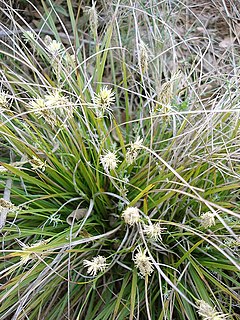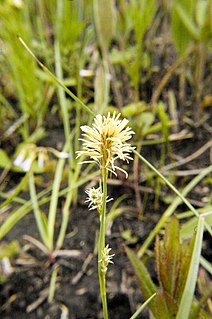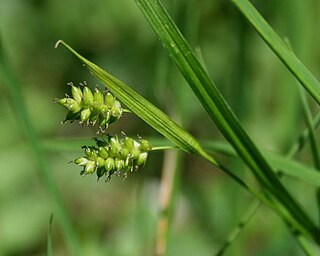
The Cyperaceae are a family of graminoid (grass-like), monocotyledonous flowering plants known as sedges. The family is large, with some 5,500 known species described in about 90 genera, the largest being the "true sedges" genus Carex with over 2,000 species.

Carex is a vast genus of more than 2,000 species of grass-like plants in the family Cyperaceae, commonly known as sedges. Other members of the family Cyperaceae are also called sedges, however those of genus Carex may be called true sedges, and it is the most species-rich genus in the family. The study of Carex is known as caricology.

Carex vesicaria is an essentially Holarctic species of sedge known as bladder sedge, inflated sedge, and blister sedge. It has been used to insulate footwear in Norway and among the Sami people, and for basketry in North America.
Carex gunniana is an Australia species of sedge that was first described in 1845 by Boott in the Proceedings of the Linnean Society of London. It is native to eastern Australia and Tasmania.

Carex viridula, known as little green sedge, green sedge, or greenish sedge, is a small flowering plant native to North America, Europe, Asia, and Morocco.

Carex tetanica is a species of sedge and is native to the US and Canada
Carex vacillans is a species of sedge.
Carex vestita is a species of sedge.
Carex virescens is a species of sedge and is native to Canada and the US.
Carex xerantica is a species of sedge.
Carex × akitaensis is a species of sedge. The parent species are Carex middendorffii and Carex sadoensis.
Carex × beckmannii is a species of sedge and is native to Europe.
Carex × biharica is a species of sedge and is native to Europe.
Carex × decolorans is a species of sedge.
Carex × elytroides is a species of sedge and is native to Europe.
Carex × evoluta is a species of sedge and is native to Belgium, Czechoslovakia, Estonia, Finland, France, Germany, Great Britain, Hungary, Ireland, Italy, Latvia, Lithuania, the Netherlands, Russia, Norway, Poland, Romania, and Sweden.
Carex × felixii is a species of sedge and is native to France, Italy, Estonia, latvia, and Lithuania.
Carex × involuta is a species of sedge and is native to Europe.
Carex × knieskernii is a species of sedge and is native to Maine, Massachusetts, Michigan, Minnesota, New Brunswick, New Hampshire, New York, Ontaio, Quebec, Vermont, and Wisconsin.

Carex pallescens, called pale sedge, is a widespread species of flowering plant in the genus Carex, native to the northeastern United States, eastern Canada, Iceland, Europe, Tunisia, and western Asia. It has unstable chromosome numbers.





